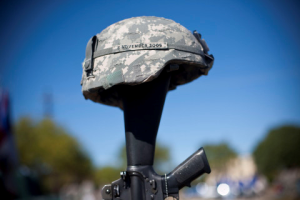The U.S. presidential campaigners keep bringing up the threat that Islamic terrorists pose to Americans, mainly Christians and Jews.
What none of them seems able or willing to acknowledge publicly — very much — is what those terrorists are doing to fellow Muslims.
Did you see the story the other day about the mosque in Damascus, Syria, that was attacked by Islamic State ghouls? Dozens of Muslims, mainly Shiites, were killed in the attack.
It was only the latest in a long and miserable string of such attacks that have been occurring throughout the Middle East — and in other primarily Muslim countries — since, oh, forever.
The Islamic State’s campaign against anyone who disagrees with their perverted philosophy has been aimed primarily against those within the Islamic faith. How many Muslims do you suppose have died at the hands of the ISIL monsters? Thousands? Tens of thousands?
And that brings me to my point.
The world war against ISIL must include a broad range of military action launched and coordinated by the people who (a) face the most direct threat from these terrorists and (b) have been the terrorists’ most frequent victims.
I saw the other day that Saudi Arabia is inching toward committing ground troops to the fight against ISIL in Syria. Do you know what’s so fascinating about that development, were it to come to fruition?
Saudi Arabia is a mainly Sunni Muslim nation, made up of people ISIL claims to represent.
I do not have the answer for how any world leader — whether it’s the president of the United States, the head of the European Union or a potentate in some tiny sheikdom — can muster the forces needed to fight these hideous religious perverts.
The Damascus mosque attack, though, does drive home the point that some U.S. politicians have recognized already.
It is that this country has shed enough blood already. Yes, we should continue our air campaign along with our allies who’ve also been wounded by terrorist attacks — and we should prosecute that campaign with all the vigor possible. The real fight on the ground must include those who are closest to the enemy and who stand most directly in harm’s way.
There can be no doubt ISIL has designs on spreading its terror far beyond the Middle East. That is why the countries in the region need to step up even more aggressively to take on the terrorists.
It is their fight to win.


